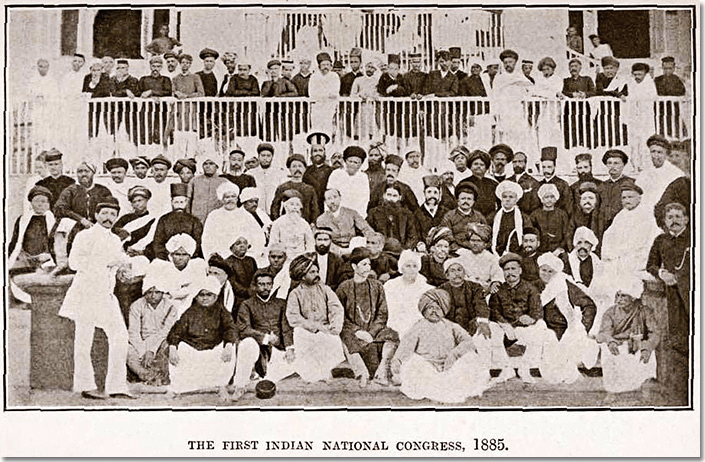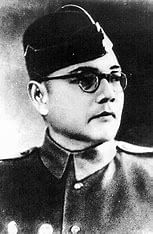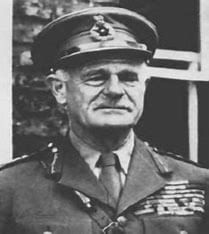Indian National Congress and Indian National Army: The Freedom Struggle | History for UPSC CSE PDF Download
The Indian National Congress ([INC], often called the Congress Party or simply Congress) is a broadly based political party in India. Founded in 1885, it was the first modern nationalist movement to emerge in the British Empire in Asia and Africa. From the late 19th century, and especially after 1920, under the leadership of Mahatma Gandhi, Congress became the principal leader of the Indian independence movement. Congress led India to independence from Great Britain and powerfully influenced other anti-colonial nationalist movements in the British Empire.

Indian National Congress
The formation of the Indian National Congress in 1885 marked a significant milestone in India's struggle for independence from British colonial rule. Stemming from various socio-political grievances and spurred by the vision of leaders like Allan Octavian Hume, the Congress emerged as a unifying platform advocating for Indian rights and representation.
Causes of the Formation of the Indian National Congress:
- Vernacular Press Act and Second Afghan War:
- The Vernacular Press Act imposed by Lord Lytton and the Second Afghan War (1878-80) led to widespread discontentment among Indians.
- They perceived British involvement in Afghan affairs as unnecessary intrusion.
Lord Ripon’s Liberal Policy:
- Lord Ripon's liberal policies fostered political awakening and a desire for local administration participation among Indians.
Ilbert Bill Controversy:
- The controversy over the Ilbert Bill sparked awareness among Indians about the need for an all-India political organization to oppose anti-national measures of the British government.
Inspiration from Allan Octavian Hume:
- Allan Octavian Hume, with silent encouragement from Lord Dufferin, inspired the establishment of the Indian National Congress in 1885.
- Hume's call for freedom and his efforts in organizing an Indian National Union laid the foundation for the Congress.
Aims of the Congress:
- The Congress aimed at the fusion of different elements of the Indian population, moral and political regeneration, and the consolidation of the union between England and India.
Evolution and Government Response:
- Initially, the government viewed the Congress as a loyal substitute for previous conferences but later became apprehensive.
- Government measures such as barring officials from Congress sessions indicated a change in attitude.
Social Base and Representation:
- The Congress had its social base among Western-educated Indians and the commercial and industrial bourgeoisie.
- It aimed to represent all races, creeds, and communities, with membership open to all.
Fundamental Principles:
- The fundamental principles included blending heterogeneous elements into a national whole, reconstruction of India, and securing modifications beneficial to India's interests.
Reforms and Famine Response:
- Congress's advocacy led to reforms like the Indian Council Act of 1892, which expanded legislative councils.
- However, dissatisfaction grew, exacerbated by the government's failure to address the severe famine of 1896 adequately.
Emergence of Extremists and Moderates:
- The Congress included both Extremists and Moderates, with differing approaches to achieving self-government.
- Moderates advocated constitutional agitation for Dominion Home Rule, led by figures like Surender Nath Banerjee and Pheroz Shah Mehta.
- Extremists, led by B.G. Tilak, favored more radical measures and harbored separatist tendencies.
Lord Curzon's Regime:
- Lord Curzon's policies, including educational reforms and the partition of Bengal, soured relations between the British and Indians.
- His use of the Sedition Act and repression of Congress leaders fueled discontent and led to a reign of terror.
Subhash Chandra Bose And Indian National Army
Subhas Chandra Bose, a prominent Swarajist and ally of C.R. Das, served as Congress President in 1938 and 1939, winning against Gandhi's wishes at Tripuri in 1939. However, controversy over the Congress Working Committee led to his resignation, succeeded by Dr. Rajendra Prasad.

Congress Presidency and Controversy:
- Bose, a Swarajist and ally of C.R. Das, served as Congress President in 1938 and 1939, winning against Gandhi's preferences.
- Controversy over the nomination of Congress Working Committee members led to Bose's resignation, succeeded by Dr. Rajendra Prasad.
Formation of Anti-Compromise Front:
- At the Ramgarh Congress of 1940, Bose organized the Anti-Compromise Front to resist concessions to British rule.
Flight and Collaboration:
- Bose fled the country on January 27, 1941, seeking support for India's independence.
- He collaborated with Rash Bihari Bose to form the Indian National Army (INA), consisting of over sixty thousand soldiers.
International Support and Declarations:
- Bose reached Tokyo on June 20, 1943, and from Singapore on August 25, 1943, declared the intention to hoist the Indian flag over the Viceregal Lodge in Delhi.
- Prime Minister Tojo of Japan pledged full support for Indian independence, leading to the establishment of the Provisional Government of Independent India (Azad Hind) in Singapore on October 21, 1943.
Recognition and Declarations of War:
- Azad Hind Government, recognized by Japan, Germany, and other nations, declared war on Britain and the U.S.A. on October 22, 1943.
- The government gained control over the Andaman and Nicobar islands, establishing a territorial base.
INA's Advance into India:
- The INA crossed into India from Burma on March 18, 1944, capturing Tiddin and advancing further.
- Bose envisioned India's independence through armed struggle, followed by Gandhi's leadership promoting non-violence globally.
Momentum and Retreat:
- Despite victories, the INA's momentum faltered after Bose's retreat to Burma in January 1945.
- The Subhas Brigade managed to defeat British Indian Army contingents, but the INA eventually had to retreat.
Surrender and Tragic End:
- Following Japan's surrender in August 1945, Bose advised the INA to surrender to the British army.
- Tragically, Bose died in a plane accident on August 23, 1945, while traveling from Bangkok to Tokyo.
THE WAVELL PLAN, 1945
- Lord Wavell sought to muster Indian national support for war against Japan which was expected to last another year. Wavell Proposals were broadcasted over A.l.R. on 14 June, 1945. 21 Indian leaders invited to Simla Conference to discuss Wavell Plan.
- Aim of the Simla Conference was to evolve agreed formula for formation of Viceroy’s Executive Council as contemplated under Cripps proposals.

Main points of Wavell Plan were:
- With the exception of the Governor-General and Commander-in-Chief all members of Executive Council to be Indians.
- Hindus and Muslims to have equal repres-entation.
- New Executive Councils to work under the existing Indian Conslitution.
- Governor-General to retain right to override Executive Council but not to use it unreasonably.
- However, Wavell announced failure of Simla Conference on 14 July, 1945.
- Reason for failure can be summed up as:
- Jinnah wanted the right to supply list of all Muslim Executive Councillors.
- Jinnah wanted special safeguards for Muslim bloc within the Council.
- Wavell conceded a virtual veto to Jinnah.
- Anglo-lndian bureaucracy worked for its failure.
Outcome of Wavell Plan
- It exposed the real character of the Conservative Government of Churchill.
- It boosted the position of Jinnah in Indian politics.
- Jinnah became the unquestioned leader of Indian Muslims.
- The establishment of Pakistan was no longer in doubt.
- Release of Congress leaders from jails gave them fresh opportunity to prepare for forthcoming general elections of 1945-46.
|
228 videos|855 docs|219 tests
|
FAQs on Indian National Congress and Indian National Army: The Freedom Struggle - History for UPSC CSE
| 1. Who was Subhash Chandra Bose and what role did he play in the Indian National Army? |  |
| 2. What was the significance of the Wavell Plan in the context of the Indian freedom struggle? |  |
| 3. How did the Indian National Congress interact with the Indian National Army during the freedom struggle? |  |
| 4. What were the key motivations behind Subhash Chandra Bose's decision to form the Indian National Army? |  |
| 5. How did the Indian National Army impact the overall trajectory of the Indian freedom struggle? |  |






















